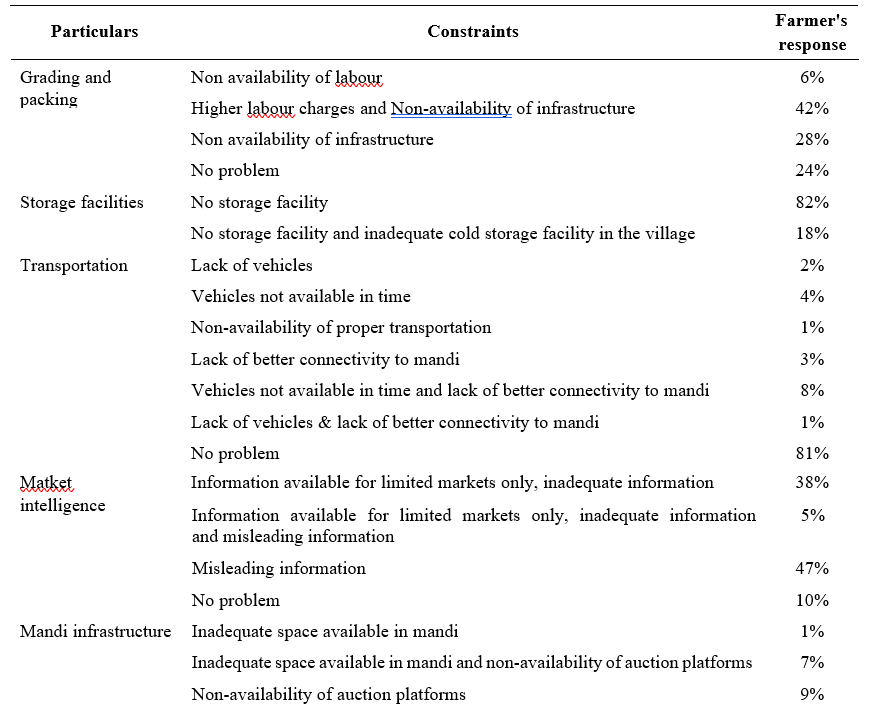Study on Marketing Constraints of Tomato Farmers in Chittoor District of Andhra Pradesh
0 Views
D. THABASUM NAZ*, P. BALA HUSSAIN REDDY, N. VANI AND SHAIK NAFEEZ UMAR
Institute of Agribusiness Management, S.V. Agricultural College, ANGRAU, Tirupati-517 502.
ABSTRACT
Tomato, one of the most viewed crops in studies and NEWS reflects instability and frequent fluctuations in case of market related aspects starting from facilities for grading and packaging to sources for required information, transportation, availability of markets, malpractices at markets etc. affects the farmers share in consumer’s rupee in tomato crop. Hence, this study aims to study constraints faced by tomato growers and chittoor district of Andhra Pradesh was purposely selected for this study as Andhra Pradesh rank first in tomato production in country which contribute 16.22 per cent of total production in India (Food and Agricultural Organization (FAO) Statistical data, 2020) and Chittoor district stands first in production of tomato in Andhra Pradesh. The study was conducted with a sample size of 120 tomato growing farmers from six top villages in production from three mandals of Chittoor district. The study revealed that malpractices in market was the major constraint faced by tomato growers and rank first, followed by mandi infrastructure and storage facilities ranked second and third in constraints whereas grading and packaging, market intelligence and transportation ranked fourth, fifth and sixth respectively in case of constraints faced by the sample tomato farmers.
KEYWORDS: Constraints, Mandi, Market intelligence, Grading, Malpractices, Packaging, Infrastructure, Instability, Fluctuations.
INTRODUCTION
Since thousands of years vegetables have been growing in India but now-a-days it has become an important commercial enterprise at both national and international levels. At present Tomato (Lycopersicum esculentum) is one among the most important and popular vegetable grown in India because of its higher production, high nutritive value and wide ecological amplitude.
Tomato cultivation (open field) in India has grown from 289,000 ha in 1991 to 865,000 ha by 2011 but the average yields have not kept similar pace the figures being 14.7 t ha-1 to 19.5 t ha-1 for respective years. The increased area reflects the high economic value to the growers and the demand of the ever increasing population.
The southern and central state s constitute much of India’s production including the states of Andhra Pradesh, Telangana, Madhya Pradesh, Karnataka, Gujarat, Odisha, West Bengal, Chhattisgarh, Maharashtra, Bihar, Haryana, Uttar Pradesh and Tamil Nadu. Andhra Pradesh state alone contributes a share of 16.22 per cent of total Indian tomato production (FAOSTAT, 2020). The annual tomato production in Andhra Pradesh state 2450.67 thousand tonnes (Ministry of Agriculture and Farmers Welfare 2019-2020) 11.66 per cent of production in India in area of 61571 hectares with productivity of 42.49 tonnes ha-1. (India Stat 2016-2017). In Andhra Pradesh, Chittoor district occupies the first place in production, with an area of 9858 hectares and a production of 43.37 thousand metric tonnes (District Horticulture Office, Chittoor, 2020-21) followed by Ananthapur and Kurnool districts which contribute to 20 per cent of state tomato production (RARS, Data base).
Despite the status, the tomato farmers are facing a lot of constraints relating to marketing that are hindering the growth of farmers along with the consumers. Hence there is need of understanding various constraints faced by farmers for strengthening the marketing of tomato, formulating of policies and schemes, guidance and training required to the farmers, proper communication of market information, facilitating exports etc. that can improvise the livelihood of tomato growers and end consumers of the country and create sustainable business model for tomato in India.
Hence, this study is conducted with the objective of analyzing marketing constraints faced by the tomato growing farmers in chittoor district.
MATERIAL AND METHODS
The study area, Chittoor district of Andhra Pradesh was purposively selected based on highest area under
Table 1. Constraints faced by tomato farmers


tomato cultivation. Out of 66 mandals in the district, top three with highest area under tomato cultivation were selected for the study viz., B.Kothakota, Kalakada and Gurramkonda mandals.
Two villages with highest area of tomato from each mandal were selected. The villages selected were
- Kothakota, Upparavaripalli, Penukondapalem, Devalapalli, Gurramkonda and Ellutla. 20 farmers from each village were selected randomly. Respondents were personally interviewed using well prepared, pre-tested interview schedule.
RESULTS AND DISCUSSION
To analyze the marketing constraints faced by the tomato growing farmers in Chittoor district
Grading and packaging
In Chittoor district, tomato growers had a problem regarding higher labour charges and non-availability of infrastructure (42.00%). About 28.00 per cent of the respondents reported that they are facing problems related to availability of infrastructure for grading and packaging. Some of the farmers (6.00%) express that non availability of labour for grading and packaging.
Storage facility
In Chittoor district a large portion (82.00%) of farmers are facing problems related to storage. As tomato is highly perishable crop due to non-availability of storage facilities the mature crop is picked and sold immediately.
Transportation
In case of transportation according to respondents 81.00 per cent of them do not have any problem relating to transportation. 8.00 per cent of the farmers report that during peak harvesting there would be problem relating to availability of vehicles and lack of better connectivity to mandi.
Market intelligence
47.00 per cent of the farmers report that information is misleading in the markets, 38.00 per cent of the farmers explained that Information is available for limited markets only and so they have inadequate information regarding markets.
Mandi infrastructure
54.00 per cent of the respondents report that they do not have any problems relating to mandi infrastructure.
27.00 per cent of the respondents express that there is no storage facility for the farmers at mandies in order to store their produce.
Malpractices in market
32.00 per cent of the respondents report that commission in high at markets by the commission agents. 30.00 per cent of the farmers said that they do not have any problem relating to malpractices at markets.
27.00 per cent of farmers said that quotes lower prices than actual price at markets, Farmers also have problem relating to higher charges at markets.
Table 2 shows the ranking given by the farmers relating to the marketing constraints faced by them. This explains that malpractices in markets rank first among the constraints with mean score of 72.6 followed by mandi infrastructure and storage facilities which rank second and third with mean scores of 58 and 56.35, grading and packaging rank fourth with mean score of 45.25, market
Table 2. Ranking of marketing constraints faced by tomato farmers

intelligence rank fifth with a mean score of 39.45 and transportation rank sixth with mean score of 28.35.
From the study it is concluded that malpractices in markets and mandi infrastructure are the major constraints faced by the tomato farmers whereas market intelligence and transportation are the least affecting marketing constraints to the tomato farmers of Chittoor district of Andhra Pradesh.
LITERATURE CITED
Balusu, G., Banerjee, P.K and Bandi, S. 2017. Constraints in marketing vegetables and suggestions as perceived by growers for improving vegetable marketing. Agriculture Update. 12.
Chaudhary, J., Lal, H and Ti, A. 2018. Constraints in Marketing of Vegetables in Kangra District of Himachal Pradesh. International Journal of Current Microbiology and Applied Sciences. 7: 243-251.
Dhanta, R., Tewari, S.C and Yadav, A. 2020. From Farm to Market: Analyzing production cost and marketing management of off-season vegetables in Himachal Pradesh.
Kumar, Shailesh, R., Mukherjee, M and Anirban. 2018. Marketing behaviour of vegetable growers in Uttarakhand hills. Journal of Community Mobilization and Sustainable Development. Vol. 13(1): 68-74.
Nurmala, N., Zahara, H., Sullaida, S. and Jamilah, J., 2021. Identification of business constraints and marketing of potatoes in aceh’s gayo highlands. International Journal of Educational Review, Law and Social Sciences (IJERLAS). 1(2): 239-244.
- Genetic Divergence Studies for Yield and Its Component Traits in Groundnut (Arachis Hypogaea L.)
- Correlation and Path Coefficient Analysis Among Early Clones Of Sugarcane (Saccharum Spp.)
- Character Association and Path Coefficient Analysis in Tomato (Solanum Lycopersicum L.)
- Survey on the Incidence of Sesame Leafhopper and Phyllody in Major Growing Districts of Southern Zone of Andhra Pradesh, India
- Effect of Organic Manures, Chemical and Biofertilizers on Potassium Use Efficiency in Groundnut
- A Study on Growth Pattern of Red Chilli in India and Andhra Pradesh

